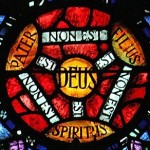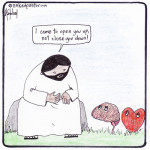We run our website the way we wished the whole internet worked: we provide high quality original content with no ads. We are funded solely by your direct support. Please consider supporting this project.

A Cross-Like Church
When God’s church loves like God loves—which means valuing the other at cost to self—it will puzzle those outside the church. While such love might cause the religious to rail with outrage, it will cause the searching and the hungry to ask, “how can people love like this?” In God’s plan, this puzzle is what prepares people to believe that Jesus Christ is Lord and to surrender their lives to him.
The evangelistic task of the Christian community, in other words, is to live and love in a way that draws people and cries out for explanation. Our proclamation only has as much credibility as our love requires explanation.
For too long the church has blamed the world for how ineffective it is at attracting people. Evidence that we have failed to love like God loves is found in the long-standing pattern of the church deflecting responsibility for its own sin and placing it on the world. If people are not being drawn to the Lord by the church’s love, this is the fault of the church. For Jesus taught us from the start that it is by our love, not just by our words, that people will know he is real and be drawn into a relationship with him. Christ convinced us of the love of God by demonstrating it on the cross while we were still sinners (Romans 5:8). We are called to do the same toward others.
By God’s own design—a design that recaptures the purpose for which God created the world—hurting and hungry people are to be drawn into the reality of God’s cross-like love by seeing it demonstrated in his body. Christ did this in his earthly body, which is why sinners were attracted to him. And he longs to do this again through his church body.
To the extent that the church embodies the spirit of Jesus as ultimately displayed on the cross, it will be a magnet for the hurting and the outcast.
On the other hand, to the extent that the church embodies a judgmental, critical spirit that sets up a perimeter, it will repel them.
This means that the church must be freed from any obsession with determining or developing rules that assess who is “in” and who is “out.” It must be ok with wheat and weeds growing alongside each other (Matt 13). When a church is focused on defining the perimeter that establishes boundaries for who is right and who is wrong, it will to some extent be getting its fulfillment and life from what it is “against,” rather than what is it “for.”
Sadly, far too many churches acquire their sense of worth and identity by their religious self-identity, where there is constant judgment and assessment whether people believe the right things and act the right ways. When we define Christianity as “standing up for God” or defending a specific version of orthodoxy, we are focusing on the perimeter, not the cross of Christ. And as a result, we fall short of loving like God loves.
Churches will only embody and demonstrate to the world the cruciform life of Christ when we are defined by the center of God’s cruciform love. This empowers them to let go of any attempt to get life from their perimeter. They don’t need to police the perimeter to ensure that everyone looks and believes exactly as they do.
As a result, a church that lives out of the center of the cross is willing to have their reckless love scorned by the religious rule-keepers as compromising, relativistic, liberal, soft on doctrine, or anti-religious. After all, what kind of church attracts and embraces those who are judged by the religious, i.e. prostitutes, drunkards, those from the LGBT community, and drug addicts? In such a church, the perimeter between those who are “in” and those who are “out” is blurred, as seekers find love without judgment, and they have a gnawing suspicion that this is that for which they were created.
Adapted from Repenting of Religion, pages 198-200
Photo credit: Jesper Yu via Visualhunt.com / CC BY-NC-ND
Category: General
Tags: Church, Evangelism, Love
Topics: Following Jesus
Related Reading

The Evangelical Heart
qthomasbower via Compfight Rachel Held Evans posted recently about The Scandal of the Evangelical Heart. Citing a comment by John Piper (“It’s right for God to slaughter women and children anytime he pleases. God gives life and he takes life. Everybody who dies, dies because God wills that they die.”) she notes that when we approach the Bible in…

Corrective Love
drp via Compfight Kathy Escobar posted the other day about providing “corrective experiences” to those who have been hurt in the past. How many of us have approached Christians with our wounds and have been offered more of the same instead of the love and acceptance we’re longing for? How beautiful it would be if…

The Case for Women in Ministry
Kathy’s Struggle with Temptation Kathy was one of the brightest students I ever had when I taught Theology at Bethel University. She asked insightful questions and often contributed to lively class discussions. The time and energy she put into her theology classes was motivated by more than just a desire to get a good grade.…

Does the Doctrine of the Trinity Matter?
Jesus reveals the greatest, most beautiful, and mysterious aspect of God when he, despite being himself God Incarnate, relates to God as his “Father” and refers to God as “the Holy Spirit.” There is, of course, only one God (1 Cor 8:6). Yet Jesus reveals that God somehow exists as Father, Son and Holy Spirit.…

What Kind of God Did Jesus Reveal?
The ReKnew Manifesto exists to encourage believers and skeptics alike to re-think things they thought they already knew – hence our name, Re-Knew. I am currently working through the theology of the Manifesto in a series of posts that began a couple of months ago. Over the last few posts, we have been looking at the…

